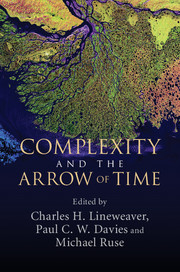Book contents
- Frontmatter
- Contents
- Author biographies
- Part I Introduction
- Part II Cosmological and physical perspectives
- 2 Directionality principles from cancer to cosmology
- 3 A simple treatment of complexity: cosmological entropic boundary conditions on increasing complexity
- 4 Using complexity science to search for unity in the natural sciences
- 5 On the spontaneous generation of complexity in the universe
- 6 Emergent spatiotemporal complexity in field theory
- Part III Biological complexity, evolution, and information
- Part IV Philosophical perspectives
- Index
- References
4 - Using complexity science to search for unity in the natural sciences
from Part II - Cosmological and physical perspectives
Published online by Cambridge University Press: 05 July 2013
- Frontmatter
- Contents
- Author biographies
- Part I Introduction
- Part II Cosmological and physical perspectives
- 2 Directionality principles from cancer to cosmology
- 3 A simple treatment of complexity: cosmological entropic boundary conditions on increasing complexity
- 4 Using complexity science to search for unity in the natural sciences
- 5 On the spontaneous generation of complexity in the universe
- 6 Emergent spatiotemporal complexity in field theory
- Part III Biological complexity, evolution, and information
- Part IV Philosophical perspectives
- Index
- References
Summary
Nature writ large is a mess. Yet, underlying unities pervade the long and storied, albeit meandering, path from the early universe to civilization on Earth. Evolution is one of those unifiers, incorporating physical, biological, and cultural changes within a broad and inclusive cosmic-evolutionary scenario. Complexity is another such unifier, delineating the growth of structure, function, and diversity within and among galaxies, stars, planets, life, and society throughout natural history. This chapter summarizes a research agenda now underway not only to search for unity in Nature but also, potentially and more fundamentally, to quantify both unceasing evolution and increasing complexity by modeling energy, whose flows through non-equilibrium systems arguably grant opportunities for evolution to create even more complexity.
COSMIC EVOLUTION
Truth be told, I am a phenomenologist – neither a theorist studying Nature from first principles (I’m not smart enough) nor an experimentalist actually measuring things (although I used to). My current philosophy of approach aims to observe and characterize Nature thermodynamically, seeking to explicate a scientific worldview that chronicles systematically and sequentially the many varied changes that have occurred from the big bang to humankind on Earth. I call that epic worldview cosmic evolution.
- Type
- Chapter
- Information
- Complexity and the Arrow of Time , pp. 68 - 79Publisher: Cambridge University PressPrint publication year: 2013
References
- 9
- Cited by



